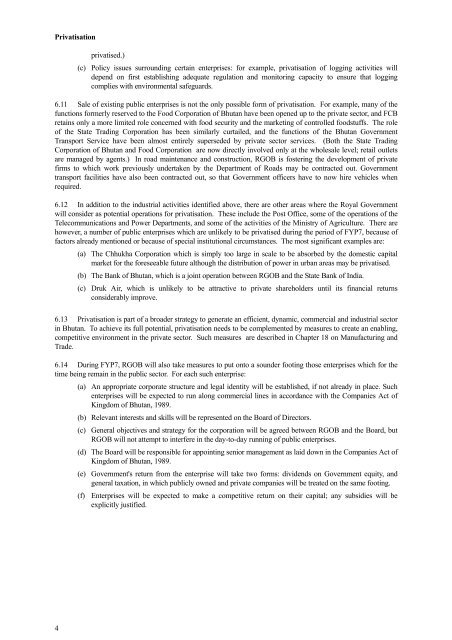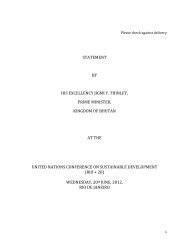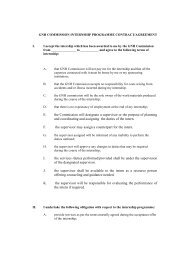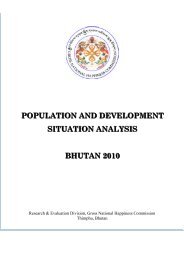COUNTRY BACKGROUND - Gross National Happiness Commission
COUNTRY BACKGROUND - Gross National Happiness Commission
COUNTRY BACKGROUND - Gross National Happiness Commission
You also want an ePaper? Increase the reach of your titles
YUMPU automatically turns print PDFs into web optimized ePapers that Google loves.
Privatisation<br />
4<br />
privatised.)<br />
(c) Policy issues surrounding certain enterprises: for example, privatisation of logging activities will<br />
depend on first establishing adequate regulation and monitoring capacity to ensure that logging<br />
complies with environmental safeguards.<br />
6.11 Sale of existing public enterprises is not the only possible form of privatisation. For example, many of the<br />
functions formerly reserved to the Food Corporation of Bhutan have been opened up to the private sector, and FCB<br />
retains only a more limited role concerned with food security and the marketing of controlled foodstuffs. The role<br />
of the State Trading Corporation has been similarly curtailed, and the functions of the Bhutan Government<br />
Transport Service have been almost entirely superseded by private sector services. (Both the State Trading<br />
Corporation of Bhutan and Food Corporation are now directly involved only at the wholesale level; retail outlets<br />
are managed by agents.) In road maintenance and construction, RGOB is fostering the development of private<br />
firms to which work previously undertaken by the Department of Roads may be contracted out. Government<br />
transport facilities have also been contracted out, so that Government officers have to now hire vehicles when<br />
required.<br />
6.12 In addition to the industrial activities identified above, there are other areas where the Royal Government<br />
will consider as potential operations for privatisation. These include the Post Office, some of the operations of the<br />
Telecommunications and Power Departments, and some of the activities of the Ministry of Agriculture. There are<br />
however, a number of public enterprises which are unlikely to be privatised during the period of FYP7, because of<br />
factors already mentioned or because of special institutional circumstances. The most significant examples are:<br />
(a) The Chhukha Corporation which is simply too large in scale to be absorbed by the domestic capital<br />
market for the foreseeable future although the distribution of power in urban areas may be privatised.<br />
(b) The Bank of Bhutan, which is a joint operation between RGOB and the State Bank of India.<br />
(c) Druk Air, which is unlikely to be attractive to private shareholders until its financial returns<br />
considerably improve.<br />
6.13 Privatisation is part of a broader strategy to generate an efficient, dynamic, commercial and industrial sector<br />
in Bhutan. To achieve its full potential, privatisation needs to be complemented by measures to create an enabling,<br />
competitive environment in the private sector. Such measures are described in Chapter 18 on Manufacturing and<br />
Trade.<br />
6.14 During FYP7, RGOB will also take measures to put onto a sounder footing those enterprises which for the<br />
time being remain in the public sector. For each such enterprise:<br />
(a) An appropriate corporate structure and legal identity will be established, if not already in place. Such<br />
enterprises will be expected to run along commercial lines in accordance with the Companies Act of<br />
Kingdom of Bhutan, 1989.<br />
(b) Relevant interests and skills will be represented on the Board of Directors.<br />
(c) General objectives and strategy for the corporation will be agreed between RGOB and the Board, but<br />
RGOB will not attempt to interfere in the day-to-day running of public enterprises.<br />
(d) The Board will be responsible for appointing senior management as laid down in the Companies Act of<br />
Kingdom of Bhutan, 1989.<br />
(e) Government's return from the enterprise will take two forms: dividends on Government equity, and<br />
general taxation, in which publicly owned and private companies will be treated on the same footing.<br />
(f) Enterprises will be expected to make a competitive return on their capital; any subsidies will be<br />
explicitly justified.

















